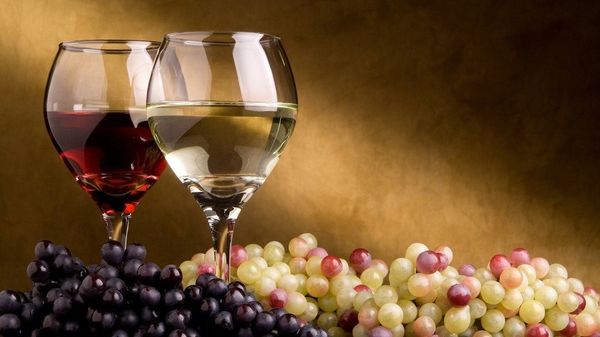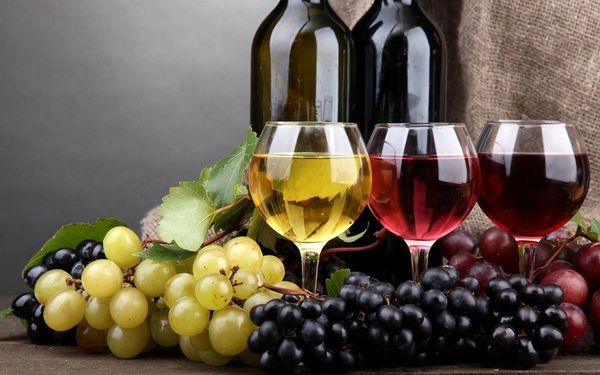Which wine is better than white wine and red wine?

Wine is produced from grapes
What is Wine?
Wine made from fermented grape juice.
The grapes are picked, crushed and placed in a bucket or basket for fermentation. Fermentation will convert natural sugars in grape juice into wine.
Fermentation can occur naturally, but sometimes people make alcohol for more yeast to help control this process.
The pressed grapes will be put through a press, which eliminates shells and residues. The fact that this step will be taken before or after fermentation will determine whether the wine will become red or white.
To make white wine, grapes are pressed before fermentation. Red wine is pressed after fermentation.
After this step, the wine will be brewed in stainless steel or oak barrels until it is ready to be bottled.
Conclusion: Wine is made from fermented grape juice. Grapes are picked, crushed and then fermented in barrels or jars.

Comparison table between nutrition
White wine and Red wine
The Difference Between Red And White Wine?
The main difference between white and red wine is whether or not the grape juice is fermented with grape skin.
To make white wine, grapes are pressed and peeled, seeds and stalks are removed before fermentation.
However, to make red wine, crushed grapes will be transferred to the jars directly and they will ferment with shells, seeds and stems. The grape skins will lend alcohol to its pigments, as well as a lot of special healthy compounds found in red wine.
Due to being soaked in grape skins, red wine is especially rich in plant compounds that are present in grape skins, such as tannins and resveratrol.
White wine also has a number of healthy plant compounds, but generally in much lower quantities.
Various varieties of fine grape varieties have been used to produce wine, including Pinot Gris, Syrah and Cabernet Sauvignon.
While good red grape varieties are used to make red wine, white wine can actually be made from red or white grapes. For example, traditional French champagne is made with Pinot Noir red.
Many countries produce wine. Some of the major wine growing regions are in France, Italy, Spain, Chile, South Africa, Australia and California in the United States.
While most areas grow some good varieties of grapes, some are especially known for one or two, such as Chardonnay of the Napa Valley region, Spain's Tempranillo and South Africa's Chenin Blanc.
Conclusion: Red wine is fermented with the shell, which gives its wine its color and provides beneficial plant compounds. On the other hand, grapes for white wine are removed.
Nutrition Comparison
Red and white wine has a very similar nutritional composition table.Red and white wine has a very similar nutritional composition table.However, looking at the nutritional content of each 5 oz glass (148 ml), you can see that there are some differences. Overall, red wine has a slightly higher threshold than white wine because it There are a few higher vitamins and minerals. However, white wine contains fewer calories.
Conclusion: When talking about nutrition, red and white wine are equal. However, red wine has a slightly higher concentration of vitamins and minerals
Open in Google Translate Feedb

Benefits Of Red Wine
Because it is fermented with grapes and grape seeds, red wine contains many plant compounds that provide many health benefits.
It Can Help Reduce The Risk Of Heart Disease
Red wine is believed to be the secret behind the French paradox (French paradox).
It is a view that there are relatively few cases of heart disease in France, despite the habit of eating a diet high in saturated fat.
Research has found that drinking red wine may help protect the cardiovascular system.
In fact, people have linked it with reducing the risk of death because of a 30% lower heart disease.
Somewhat likely is because alcohol contains compounds that have both effects as antioxidants and anti-inflammatory. These substances help reduce the risk of heart disease.

It Can Help Increase Cholesterol "Good" HDL
Red wine has also been shown to increase HDL "good" cholesterol levels, which are thought to be associated with a reduction in heart disease rates.
A small study showed that adults were told to take 1-2 glasses of red wine a day for four weeks showed an increase of 11-16% of their HDL levels, compared with those who were alone. Simply drink water, or water and extract grapes.
It Can Slow Down The Brain Disease
Some studies have shown that drinking red wine may help slow down mental decline that is related to age.
This may be partly due to the activity of resveratrol's antioxidant and anti-inflammatory agents, an antioxidant-like compound in red wine.
Resveratrol seems to block protein particles called beta-amyloid formation. These beta amyloids play an important role in the formation of plaque in the brain, which is a sign of Alzheimer's disease (dementia caused by brain cell deterioration).
Using wine properly will be good for health
It Can Help Increase Cholesterol "Good" HDL
Red wine has also been shown to increase HDL "good" cholesterol levels, which are thought to be associated with a reduction in heart disease rates.
A small study showed that adults were told to take 1-2 glasses of red wine a day for four weeks showed an increase of 11-16% of their HDL levels, compared with those who were alone. Simply drink water, or water and extract grapes.
It Can Slow Down The Brain Disease
Some studies have shown that drinking red wine may help slow down mental decline that is related to age.
This may be partly due to the activity of resveratrol's antioxidant and anti-inflammatory agents, an antioxidant-like compound in red wine.
Resveratrol seems to block protein particles called beta-amyloid formation. These beta amyloids play an important role in the formation of plaque in the brain, which is a sign of Alzheimer's disease (dementia caused by brain cell deterioration).
Other Benefits of Resveratrol
Resveratrol has been extensively studied for its potential benefits when used as a supplement. In concentrated doses, resveratrol seems to have the following benefits:
Helps alleviate joint pain: It prevents cartilage from being damaged
Useful for diabetes: It increases insulin sensitivity. In animal studies, resveratrol has prevented diabetes complications.
Extend the lifespan of different organs: It does this by activating genes that help avoid old-age diseases.
May be useful for cancer: the potential of Resveratrol is to prevent and treat cancer that has been extensively studied, but the results are still not the same.
Conclusion: Red wine has been thought to be associated with a variety of health benefits. It is thought to help reduce the risk of heart disease, increase HDL cholesterol and slow age-related mental decline.

Other Health Benefits Of Wine
Many studies have specifically emphasized red wine, but white wine and other wines are also associated with health benefits.
Here are some key ones:
Reducing the risk of heart disease: More than 100 studies have shown that moderate alcohol consumption has been linked to a 25-40% reduction in the risk of heart disease.
Reducing the risk of death from heart disease or stroke: In a Danish study, people who drank wine from a low to moderate amount were less likely to die from heart disease or stroke, compared to those drinking beer or other spirits.
Better cholesterol levels: Moderate amounts of wine also seem to help improve cholesterol levels.
Reducing the risk of death: Many population studies have shown that wine drinkers have a lower risk of death for any cause, including heart disease.
Reducing the risk of neurodegenerative diseases: People who drink mild to moderate wines or other alcoholic beverages are also at risk for lower neurodegenerative diseases, such as Alzheimer's and Parkinson's, compared to with non-drinkers
Reducing the risk of osteoarthritis: At least one study found that people who drink alcohol are at lower risk than those who drink beer
Reduced risk of cancer: Observational studies show that people who drink alcohol may reduce the incidence of lung cancer.
In other words, it is important to remember that these studies are observational forms in nature. They cannot prove causal relationships and we should not completely believe in them.
Conclusion: In general, drinking low to moderate amounts of alcohol is thought to be associated with a lower risk of certain diseases.
Disadvantages Of Drinking Wine
The biggest drawbacks of drinking alcohol come from drinking it too much.
How much is too much depends on the person you ask, because the guidelines for low-risk drinking vary from country to country.
The World Health Organization (WHO) recommends no more than two standard drinks a day, five days a week.
Many separate countries, including the US, recommend limiting alcohol to less than two drinks a day for men and one drink a day for women. The upper limit in some countries is even less.
A standard glass is defined as a 12% glass of 5-oz alcohol (148 ml).
Note that many "big" red wines, such as those from California, often contain more alcohol in wine, around 13-15% by volume.
The health benefits of red wine can easily be denied by drinking too much. In excess, it can cause damage to organs, dependencies and brain damage.
Drinking too much can increase the risk of infectious diseases, because it can weaken your immune system.
Moreover, drinking alcohol seems to increase the risk of developing many types of cancer.
These serious risks are the main reasons health professionals recommend that people should not start drinking alcohol for the sake of health.
Conclusion: Drinking any alcohol can have negative health consequences, especially if you drink too much


Does Red Wine Have Better Health Than White Wine?
If you are preparing to drink wine, it seems clear that red wine will be significantly healthier - or less bad than white wine.
In other words, red wine is the clear winner when it comes to getting health effects.
Although it is said, drinking alcohol should never be promoted as a way to improve health, because the harms can be huge if you drink too much.
In addition, most studies show that the benefits are observed in nature, meaning that they cannot prove cause and effect.
If you really like drinking, then red wine is a better choice, but limiting your consumption of alcohol (or avoiding it completely) is always the safest choice.
Source: https://authoritynutrition.com
Selling location:
Showroom 1: B2-08A KDT Vinhomes Gardenia, Ham Nghi Street, P. Cau Dien, Nam Tu Liem, Hanoi
Hotline: 086 863 8888
Showroom 2: 183 Trung Kinh, Yen Hoa, Cau Giay, Hanoi
Hotline: 033.23.88888




